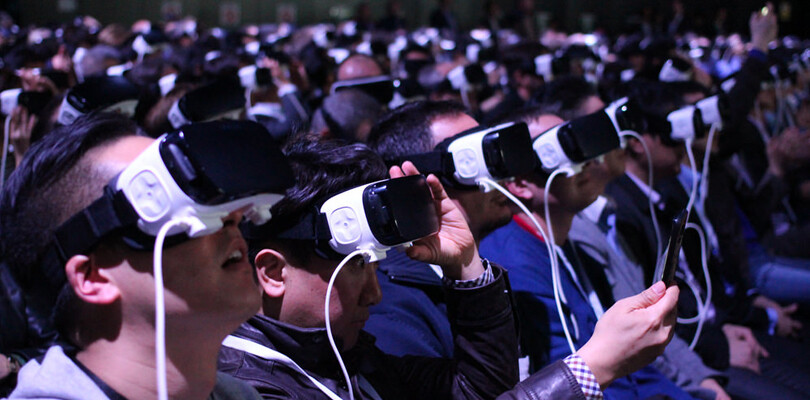Will AR, VR, or AI Hold the Most Promise for B2B Marketers?
There is an intelligent robot in my kitchen. It’s invisibly connected to thousands of supercomputers and the vast library of all human knowledge. All I have to do is ask it questions, in plain speech, and it replies nearly instantly.
I ask it to check the weather before I go outside, and sometimes to stream music.
The only thing more striking than how quickly technology is evolving, is the speed at which it becomes commonplace. I don’t use my kitchen robot to calculate rocket trajectories (which it could). I use it to meet my daily needs.
The same is true with marketing technology. A marketer from just a decade ago would marvel at the level of audience segmentation, tracking ability, and instant feedback we have. But we don’t waste time being amazed—we see how each new tool can help us be even more effective. Over time, it just becomes part of the job.
What new tech that seems amazing right now will one day be just another tool in our toolkit? What’s overhyped and what’s overlooked?
To get the answers, we asked four future-looking marketers for their take on new technology. We asked:
What tech holds the most promise for the future of B2B marketing: Artificial Intelligence (AI), virtual reality (VR), or augmented reality (AR)?
Here’s what they had to say.
Carla Johnson, Keynote Speaker, Type A Communications
Artificial intelligence holds the most promise for B2B marketing because it addresses the biggest challenge we have with delivering exceptional customer experience – latency. It isn’t about getting the right information to the right person so they deliver a remarkable experience. It’s about getting the right information to the frontline person making decisions in the moment they need the information so that they can make better decisions faster. That’s how you consistently deliver experiences that make your brand stand apart.
Neal Schaffer, CEO & Principal Social Media Strategy Consultant, Maximize Your Social
Artificial intelligence definitely holds the most promise for B2B marketing. It will allow marketers to better analyze, execute upon, and personalize everything as a company that they do in their marketing, from messaging to advertising to even one-on-one engagement in social media.
The fact that artificial intelligence is also a complementary technology means that once the tools are available for use, adoption will be quick, especially by B2B tech brands who best understand and wish to exploit it for the competitive advantage it will offer them.
Matt Heinz, President, Heinz Marketing
I’m most excited about AI for B2B marketing. The better we can identify or predict needs and intent, the better we can serve our customers and prospects.
Mitch Joel, President, Mirum
After tinkering with the many formats and giving hour-long keynote presentations on the current opportunities (and obstacles) in the VR and AR space for brands today all over the world: I have no doubt that virtual reality/augmented reality/mixed reality will be the next - and only - platform going forward, regardless of B2B or B2C. It’s the same way I felt about the internet after seeing the first Web browser in action during the early nineties.
We will move away from the Internet and mobile (as the pipe), and the way in which we connect to information and one another will come from this new tech stack. "Mixed" reality seems like the better term these days (it's also confusing to always write "augmented reality and virtual reality"), as consumers will be able to move from a place where they are seeing their physical world with information layered on top of it, and then opt into a completely virtual experience seamlessly (if desired or needed).
That futuristic statement is, probably, more than a ways off, but it will happen and it will happen sooner than artificial intelligence (I believe). We will no longer think about connectivity in terms of computers, desktops, laptops, tablets, smartphones, wearables, etc... connectivity and experiences will be very, very different. Everything will be in front of our eyes and we will navigate with voice, our eyes, movements and... yes... our hands.
It's hard to know just how fast this will all take hold, but we have enough of the major players already deeply vested and pushing this technology forward. Facebook has Oculus. Microsoft has HoloLens. Apple is coming (if you believe the rumours). Google has Tango and Cardboard (plus investments in companies like Magic Leap). Snapchat is just getting warmed up with Spectacles. Companies like Samsung, Sony and many others have their own plays.
In short: everyone is in the game... and everyone is highly invested in trying to dominate this platform when the mass adoption hits. Make no mistake about, this is where the push is coming from. So, while Salesforce's Einstein is promising on the AI front, I believe VR might happen sooner.
The Future of Tomorrow Is Today
Given these responses, we may be asking the wrong question. It’s not VR, AR, or AI. The future of B2B marketing will likely involve all three. AR and VR will allow us to provide incredibly compelling, immersive experiences for clients and prospects alike. AI will help us fine-tune and personalize messaging and deliver it to the right person at the speed of thought.
All of this sounds like a dream you might have after binge-watching too much Star Trek. But in the next few years, these three technologies will become just as commonplace as the robot in my kitchen. Smart marketers will invest now in the skills and training they need to use these tools for more than checking the weather.
Stay up-to-date on the latest tech and trends in marketing: Subscribe to the LinkedIn Marketing Solutions blog.




